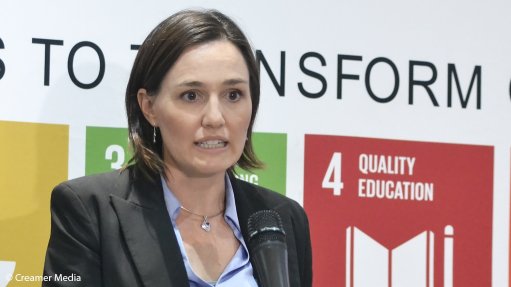
Plus Economics research director Dr Kirsten Thompson
Photo by: Creamer Media's Donna Slater
The broad-based deterioration of global economic prospects may cause setbacks in the pursuit of the United Nation’s (UN’s) Sustainable Development Goals (SDGs), the UN’s ‘World Economic Situation and Prospects’ report has found.
According to the report, which was discussed with media on Wednesday, a dynamic and inclusive global economy is essential to meet the ambitious targets of the 2030 Agenda for Sustainable Development.
However, global progress is not happening fast enough, meaning that the world may actually miss achieving some of the SDGs, it states.
In conversation with Engineering News, Plus Economics research director Dr Kirsten Thompson said the challenges the world was facing, “cannot be grown out of” in respect of economic growth.
“Economic growth is actually not the be-all and end-all,” she said, adding that in order to achieve the SDGs by 2030, “policy makers need to be more forceful and more rigid in their decision-making”.
This means that clear-cut policies and certainty are a must, and the UN is hopeful that through the report, “readers can hopefully exercise their democratic processes to ensure that we see leaders who are able to implement the policies that they design”.
Amid prolonged trade disputes and wide-ranging policy uncertainty, the report further highlights that the world has seen “a significant and broad-based deterioration over the past year”, which threatens to impede efforts to reduce poverty, create decent jobs, broaden access to affordable and clean energy and achieve many of the other SDGs.
Global gross product growth slipped by 2.3% in 2019, marking the lowest rate since the global financial crisis of 2008/9. According to the UN’s report, this slowdown is occurring alongside growing discontent with the social and environmental quality of economic growth and amid “pervasive inequalities and the deepening climate crisis”.
Based on the assumption that potential setbacks will not materialise, the report forecast a modest uptick in global growth to 3.5% for this year but warns that policy uncertainties will “continue to weigh on investment plans”.
Meanwhile, Thompson told Engineering News that one of the key highlights to take away from the report was geopolitical tensions and trade disputes that were creating a lot of “anxiety and jitters” among global economies.
She added, however, in a South African context, “that it is not the government’s job to grow our economy by creating jobs”. Instead, she suggested that the government should be creating an enabling environment for businesses and the workforce.
“They should be doing this by creating good-quality education, skills and vocational training for our workforce, and a good productive environment for businesses through the provision of services and through policy certainty to improve business sentiment.”
This, Thompson averred, would be South Africa’s engine for growth.